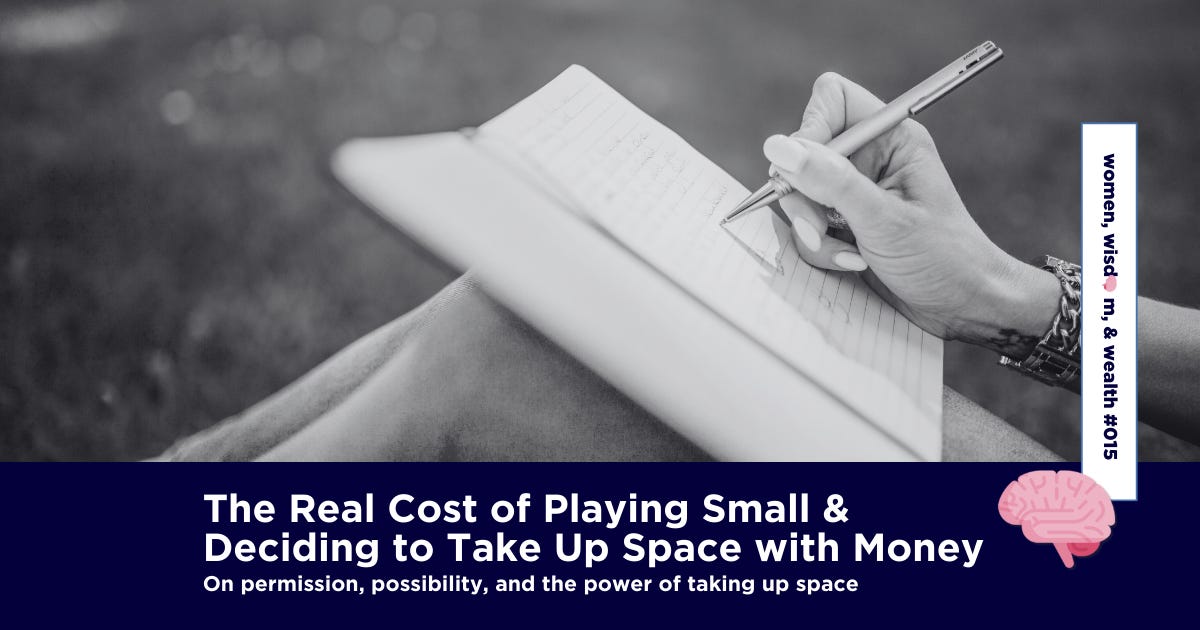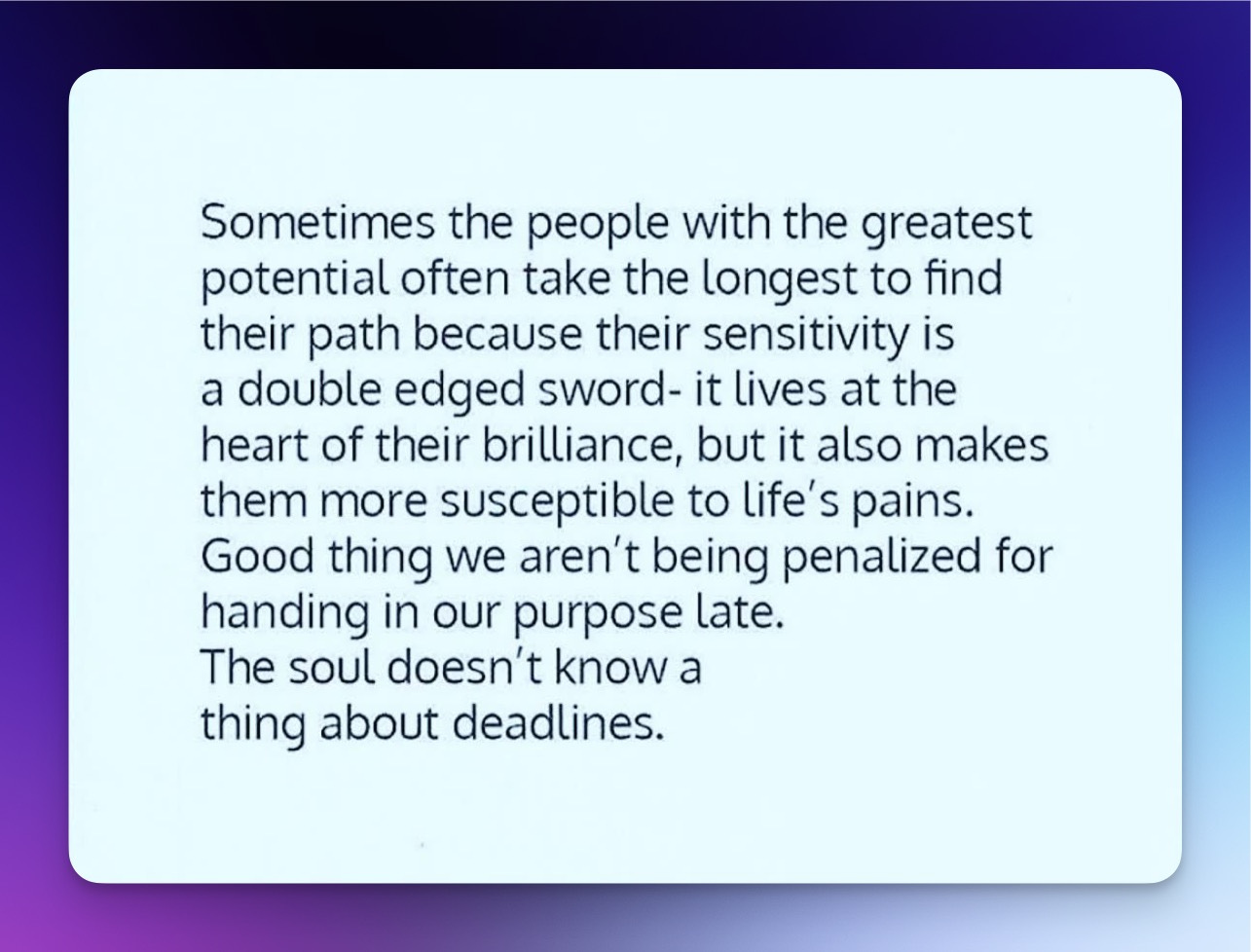The Real Cost of Playing Small & Deciding to Take Up Space with Money
On permission, possibility, and the power of taking up space
I had one of those moments recently that stopped me in my tracks.
I was preparing for my upcoming Master's program (starting next week!), reviewing some materials about the gender wealth gap, when a memory from my early career days hit me like a ton of bricks.
Picture this: I was in my early 30s, managing a homestore for a major retailer.
I worked 50+ hours a week, commuting 2 hours daily as a single mom (the company asked me to open a new store an hour from my house a year after my husband passed away 🙄… I said yes for fear of losing a promotion down the road).
Because of the additional commute (and childcare expenses), I asked for an increase to help cover the increase I’d be spending on gas. My boss got something for me, but that was after the HR department said, “Well, we don’t usually do this.” (Gee, wasn’t I lucky? <sarcasm>)
However, it never occurred to me to negotiate my initial salary when the company hired me.
I never once questioned why I wasn't earning more. I was too busy being praised for my work ethic and reliability to notice I was playing small with money.
The wild part? Back then, I didn't even know that women earned less than men.
How could I?
The Internet wasn’t what it is today (it was 2004), and the wage gap wasn't making headlines in the newspaper. I was doing what I was "supposed" to do—working hard, being responsible, and checking all the boxes.
Here's the thing, though - playing small with money isn't just about salaries and our bank accounts.
It's about the space we allow ourselves to take up in the world.
And let me tell you... it comes with a hefty price tag.
Here’s an example of a hefty price tag I didn’t pay because I was fed up.
I had a lawsuit settled around my husband’s death 5 years after he passed away.
The judge didn’t approve the initial division of funds (between myself and my children), which my attorneys had suggested (they also suggested I put money into an annuity, and they had someone to recommend to me. Fortunately, I had gotten a California Insurance license and knew that annuities came with a hefty commission for the sales rep - I said no and went to Fidelity).
Two months later, after my attorneys told me they were going to “fight it” (they did nothing but put me through two more months of hell… I wouldn’t wish a lawsuit on anyone), and when the judge approved the new division, the law firm told me I had incurred an additional $40k in expenses!!!
In TWO MONTHS! 😡
(This was after the expenses from the previous couple of years totaled only $40k. Excluding their profit from the settlement).
At this point, I had pretty much had it with attorneys, the judge, the courts, and all sides involved.
I then told the law firm I expected a detailed breakdown of all the additional expenses incurred immediately (in addition to a detailed breakdown of the initial costs).
Their response?
All expenses were dropped to $10k.
So they went from telling me I owed them $80k for expenses due to only $10k.
Think about how many people don’t question and challenge things like this?
We need to use our voices.
For all women.
By now, we've all heard about the gender pay gap (women earn roughly 82 cents for every dollar men earn- which is DOWN from .84 in 2022. It’s only .64 for women of color), but that's just the tip of the iceberg. The real story is in the wealth gap—women own only 32 cents for every dollar of wealth men own.
It shows up in subtle ways.
✔ We apologize when talking about money (guilty! 🙋♀️).
✔ We avoid checking our investment accounts because they make us anxious.
✔ We wait to "learn more" before making financial moves.
✔ We delegate financial decisions to others because "they know better."
And you know what's fascinating?
This isn't just behavior—it's a complex web of beliefs, often inherited from our mothers, grandmothers, and generations of women who didn't have access to financial power.
Think about it:
➡ How many of us grew up seeing women fully embrace their earning potential?
➡ How many had mothers who openly discussed investments?
➡ How many were taught to prioritize financial security over being "nice"?
But here's what I want you to know: You have permission to take up space with money.
To ask questions about finances (even if you think they're "basic").
To negotiate hard for what you're worth.
To make financial decisions without apologizing.
Because here's the truth: When we play small with money, we're not just shortchanging ourselves - we're shortchanging every woman who comes after us.
The world needs more women who are comfortable with money.
Who aren't afraid to build wealth.
Who can show the next generation what's possible.
And sometimes, that means returning to school at 54 to study Financial Psychology. 😉
Women You Should Know
Bonnie Y. Chan - The First Female CEO of Hong Kong Exchanges and Clearing - Abolishing all-male boards
Bonnie Y. Chan is a trailblazer in finance and leadership, serving as the first female CEO of Hong Kong Exchanges and Clearing (HKEX).
Under her visionary guidance, HKEX is taking bold steps toward gender equity by committing to abolishing all-male boards across its listed companies. Chan’s leadership exemplifies the power of women breaking barriers in traditionally male-dominated industries, inspiring a new era of inclusivity and progress in global finance. Her efforts not only champion diversity but also highlight the undeniable value of women in shaping the future of business and leadership.
Money Moves
I’m sure you’ve heard the term "lifestyle creep.” It's usually referred to as something negative - you know - when your spending increases as your income goes up.
But I've been thinking about this differently lately.
What if we intentionally allowed certain areas of our lives to "creep up" as an investment in ourselves?
For example, getting a monthly massage instead of seeing it as a splurge, or upgrading your home office setup because you spend hours there daily. It's about consciously choosing where to expand rather than contracting from a place of scarcity.
Quick tip: Make a list of three areas where investing more would genuinely enhance your quality of life. Start with a tiny upgrade and notice how it feels to take up more space in that area intentionally.
UPDATE on last week’s visit to the “Head Spa”: It was O.K., but I’m not rushing to return. For the cost, I’d rather have a 90-minute massage. 😉 (If you’re not sure what I’m talking about, read about it in last week’s newsletter under “A Gift to Myself”).
Resources
Book 📕: Morgan Housel's “Psychology of Money.” I mentioned this book in an earlier newsletter, but it's worth highlighting again. While not explicitly focused on women, Housel's insights about how personal experiences shape our money beliefs are fascinating. The chapter on wealth vs. money completely changed how I think about financial freedom.
Listen 🎧: If you haven't discovered "Financial Feminist" with Tori Dunlap yet, you're in for a treat. It's like having a brilliant friend who breaks down money topics without the stuffy financial advice (no shaming about lattes here! ☕️). Her fresh take on building wealth while tackling systemic issues is precisely what we need right now.
Article 📃: I recently discovered this writer on Medium and love her work. Her latest, “Reclaiming Autonomy: A Feminist Act in a Demanding World- How I’m taking back my time and resisting society’s demands on women” is fantastic.
It’s Never Too Late 😉
I hope you’ve all had a good start to the New Year.
I thoroughly enjoyed the two weeks over Christmas and New Year’s and am happy to return to a more regular schedule.
I’m gearing up to fit my Master’s program into my ‘regular schedule’ next week while maintaining a “gentle structure” instead of a rigid plan.
I tend to go into resistance when I feel like too much in my life is a “have to.” So, I’m sure I’ll have to remind myself every now and then that I chose to go back to school; it wasn’t a “have to.” 😉
Have a wonderful day,
Kim








Im sorry you had to go through that shitty situation, Kim, but thank you so much for sharing this! I’m only just learning (at 42) to take control of my finances and stop undervaluing myself.
You’ve got this. Continuing to teach us all your newfound wisdom is motivation to think about.